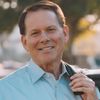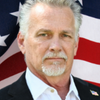Kyle Langford
Kyle Langford (Democratic Party) is running for election to the U.S. House to represent California's 26th Congressional District. He declared candidacy for the primary scheduled on June 2, 2026.[source]
Langford (Republican Party) also ran for election for Governor of California. He will not appear on the ballot for the primary on June 2, 2026.
Langford completed Ballotpedia's Candidate Connection survey in 2025. Click here to read the survey answers.
Biography
Kyle Langford was born in San Jose, California. He earned a high school diploma from Lake Oswego High School. His career experience includes working as a construction manager and as the executive director of California First PAC.[1]
Elections
2026
U.S. House California District 26
See also: California's 26th Congressional District election, 2026
General election
The primary will occur on June 2, 2026. The general election will occur on November 3, 2026. General election candidates will be added here following the primary.
Nonpartisan primary election
Nonpartisan primary for U.S. House California District 26
The following candidates are running in the primary for U.S. House California District 26 on June 2, 2026.
Candidate | ||
| Sonia Devgan-Kacker (D) | ||
| Chris Espinosa (D) | ||
 | Samuel Gallucci (R) | |
Crystal Golden (R)  | ||
 | Liam Hernandez (D)  | |
 | Jacqui Irwin (D) | |
 | Michael Koslow (R) | |
 | Kyle Langford (D) | |
| Kyle Rohrbach (D) | ||
 | William Scott (R)  | |
 | Jonathan Wagoner (R)  | |
 = candidate completed the Ballotpedia Candidate Connection survey. = candidate completed the Ballotpedia Candidate Connection survey. | ||||
| If you are a candidate and would like to tell readers and voters more about why they should vote for you, complete the Ballotpedia Candidate Connection Survey. | ||||
Do you want a spreadsheet of this type of data? Contact our sales team. | ||||
Withdrawn or disqualified candidates
- Julia Brownley (D)
Endorsements
Ballotpedia is gathering information about candidate endorsements. To send us an endorsement, click here.
Governor of California
See also: California gubernatorial election, 2026
General election
The primary will occur on June 2, 2026. The general election will occur on November 3, 2026. General election candidates will be added here following the primary.
Nonpartisan primary election
Nonpartisan primary for Governor of California
The following candidates are running in the primary for Governor of California on June 2, 2026.
Candidate | ||
 | Ethan Agarwal (D) | |
 | Ché Ahn (R)  | |
 | Jesse Alberti (No party preference)  | |
 | Xavier Becerra (D) | |
 | Chad Bianco (R) | |
 | Ian Charles Calderon (D) | |
Tony Fitzpatrick (No party preference)  | ||
 | Sharifah Hardie (R)  | |
 | Lewis Herms (No party preference)  | |
 | Steve Hilton (R) | |
 | Brandon Jones (R)  | |
 | Daniel Mercuri (R)  | |
 | Katie Porter (D) | |
 | Raji Rab (D) | |
 | Jon Slavet (R)  | |
 | George Slivka (D)  | |
 | Thomas Steyer (D) | |
 | Eric Swalwell (D) | |
 | Nicholas Thompson (L)  | |
 | Tony Thurmond (D) | |
 | Antonio Villaraigosa (D) | |
 | Butch Ware (G) | |
 | Betty Yee (D) | |
 | Michael Younger (D)  | |
 | Leo Zacky (R) | |
 = candidate completed the Ballotpedia Candidate Connection survey. = candidate completed the Ballotpedia Candidate Connection survey. | ||||
| If you are a candidate and would like to tell readers and voters more about why they should vote for you, complete the Ballotpedia Candidate Connection Survey. | ||||
Do you want a spreadsheet of this type of data? Contact our sales team. | ||||
Withdrawn or disqualified candidates
- Toni Atkins (D)
- Eleni Kounalakis (D)
- Javen Allen (No party preference)
- Kyle Langford (R)
Endorsements
Ballotpedia is gathering information about candidate endorsements. To send us an endorsement, click here.
Campaign themes
2026
U.S. House California District 26
Ballotpedia survey responses
See also: Ballotpedia's Candidate Connection
Kyle Langford has not yet completed Ballotpedia's 2026 Candidate Connection survey. If you are Kyle Langford, click here to fill out Ballotpedia's 2026 Candidate Connection survey.
Who fills out Ballotpedia's Candidate Connection survey?
Any candidate running for elected office, at any level, can complete Ballotpedia's Candidate Survey. Completing the survey will update the candidate's Ballotpedia profile, letting voters know who they are and what they stand for. More than 25,000 candidates have taken Ballotpedia's candidate survey since we launched it in 2015. Learn more about the survey here.
Help improve Ballotpedia - send us candidate contact info.
Governor of California
Ballotpedia survey responses
See also: Ballotpedia's Candidate Connection
Kyle Langford completed Ballotpedia's Candidate Connection survey in 2025. The survey questions appear in bold and are followed by Langford's responses.
| Collapse all
Key Policy Priorities:
Law and Order: I advocate for zero-tolerance crime policies, modernizing policing with AI, and using prison labor to rebuild our infrastructure. Economic Revitalization: I support "California First" energy independence, deregulation to retain businesses, and State-Work Contracts to guarantee jobs and housing for those willing to work. State Sovereignty: I prioritize building a Southern Border Wall, defending traditional values, and ensuring public safety through technology.
My background in political organization and community leadership has shown me the urgent need for change. I am a Californian who sees the potential for a unified, prosperous, and safe state. My mission is to dismantle divisiveness, restore accountability, and prioritize law-abiding citizens. Together, we can put California back on the throne as a global leader, innovator, and example to follow for generations.- I am Kyle Langford, and my vision for California is clear: safety, prosperity, and sovereignty, guided by a moral framework rooted in Catholic values. Through zero-tolerance crime policies, we will make our communities secure. With energy independence and job-focused initiatives, we will drive economic growth. By building a Southern Border Wall and defending our traditions, we will protect California's identity. As a lifelong Californian, I know our potential. Join me in restoring California's strength and pride.
- Second Key Message (Law and Order) Safety and security are non-negotiable for Californians. My zero-tolerance crime policies will enforce strict law and order. We will implement AI-driven policing to prevent crime and ensure swift justice, and utilize prison labor to rebuild our state’s crumbling infrastructure. This three-pronged strategy not only holds offenders accountable but also addresses workforce shortages, benefiting all Californians. Guided by a strong moral compass, I am committed to protecting law-abiding citizens and fostering a high-trust society. Together, our communities will be the safest in existence.
- Third Key Message (Economic Revitalization) Economic strength starts with energy independence and job creation. My "California First" plan will expand in-state oil, gas, nuclear, and renewable energy production, freeing us from foreign reliance. Deregulation will cut red tape, keeping businesses here and attracting new investment. State-Work Contracts will guarantee jobs, housing, and food for those willing to work—especially the homeless and underskilled—rebuilding our infrastructure while reducing dependency. This is about restoring prosperity, self-reliance, and pride in California.
Washington’s example resonates with me because it proves leadership isn’t about titles—it’s about rallying people around a shared purpose. He didn’t chase power; he stepped away after two terms, showing humility alongside resolve. For California, I’d follow his lead by uniting our state across divides, driving decisive action on safety and prosperity, and earning trust through results. His blend of grit, unity, and selflessness is what I aim to mirror.
In my philosophy, leadership isn’t just about power—it’s about serving the people with purpose and accountability. Maxwell’s work emphasizes these ideals, offering practical insights into leading effectively while staying true to core values. For example, his laws—like the "Law of Influence" and the "Law of Solid Ground"—underscore the importance of trust and character, which I see as foundational to addressing California’s challenges. Whether it’s protecting our environment or upholding Christian principles in public life, I draw inspiration from Maxwell’s call to lead with unwavering commitment to the common good.
- Accountability** follows closely. Officials should be transparent about their decisions and answerable for their actions. This means rejecting corruption and delivering on promises rather than offering excuses. People deserve leaders who own their responsibilities and prioritize results over political maneuvering.
- Decisiveness** and **strong leadership** are also vital. In the face of challenges—be it crime, economic struggles, or crumbling infrastructure—officials must make tough, timely decisions. Hesitation can lead to disorder, while bold action drives progress and stability.
- Accountability** follows closely. Officials should be transparent about their decisions and answerable for their actions. This means rejecting corruption and delivering on promises rather than offering excuses. People deserve leaders who own their responsibilities and prioritize results over political maneuvering.
Finally, a **commitment to public service** is indispensable. Elected officials exist to serve their constituents, not themselves or special interests. This requires putting the needs of the people first, upholding shared values, and rejecting policies that foster division or dependency.
- **Decisiveness**: From my days as a lifeguard, where I saved two lives by acting quickly under pressure, I’ve learned the value of swift, clear decisions. As governor, I’d tackle crises—whether wildfires or economic downturns—with bold, timely action, ensuring no opportunity for progress is lost to hesitation.
- **Integrity**: I’m driven by a moral compass rooted in Christian values, demanding transparency and accountability. I’d govern honestly, owning my choices and ensuring every policy serves Californians, not personal gain or special interests. Trust is earned through consistency, and I’d deliver that.
- **Empathy**: Understanding people’s struggles—be it homelessness, job loss, or safety fears—comes from listening and connecting. My background in community leadership taught me to see diverse perspectives, so I’d craft solutions that lift everyone, not just the loudest voices.
- **Commitment to Unity**: Inspired by figures like George Washington, I believe in forging a cohesive team. California’s strength lies in its people, and I’d bridge divides—party, racial, or otherwise—to rally us around shared goals: safety, prosperity, and resilience.
- **Ensure Safety and Security:** The Governor is responsible for maintaining law and order across the state. This includes enforcing strict, zero-tolerance crime policies, modernizing policing with AI technology, and using innovative solutions like prison labor to rebuild infrastructure while holding offenders accountable.
- **Drive Economic Prosperity:** Managing the state’s budget and resources is critical. The Governor must champion "California First" energy independence, cut unnecessary regulations to retain businesses and create jobs, and implement State-Work Contracts to guarantee opportunities for hardworking citizens.
- **Defend State Sovereignty:** Protecting California’s borders, identity, and traditional values is a key duty. This means building a Southern Border Wall and rejecting policies that undermine the state’s independence or erode its cultural heritage.
- **Lead with Moral Integrity:** Rooted in Christian values, the Governor must govern ethically, fostering trust and accountability. This moral leadership sets the tone for a state that prioritizes integrity in all its actions.
- **Steward the Environment:** Balancing economic growth with environmental protection is essential. The governor must ensure California’s natural resources and beauty are preserved for future generations through sustainable policies.
- **Unite and Inspire:** The Governor has a duty to dismantle divisiveness, prioritize the needs of law-abiding citizens, and build a high-trust society where all Californians can thrive together.
- **Unprecedented Unity**: I’d bridge California’s divides—party, race, region—creating a singular, unstoppable force for progress. Inspired by my vision of Christian Eco-Nationalism, I’d rally us around shared goals: safety, prosperity, and pride. Picture a state where discord fades, replaced by a collective drive to thrive as one.
- **Abundance for All**: Every Californian deserves housing, food, and healthcare. I’d push bold policies—State-Work Contracts for jobs and homes, sustainable agriculture to end hunger, and streamlined systems for accessible care. My legacy would be a state where no one lacks the basics, built on practical solutions and compassion.
- **Saving Lives and Souls**: Rooted in my love and belief in Jesus Christ, our Lord and Savior, I’d lead with a mission to protect and uplift. This means safer streets through decisive law enforcement and a spiritual renewal that touches hearts. I’d save lives by preventing crises and souls by fostering faith, offering hope amid challenges.
Even as a child during the aftermath, I sensed a change—a tension that still hasn't fully lifted. It shaped a lesson I carry now: you can never relax when it comes to security. Trust is a luxury we can’t always afford, and disasters like massive buildings collapsing must be made impossible through relentless effort. That event drilled into me the need for vigilance—whether it’s protecting a state or a nation, you do everything to prevent chaos. It’s why I’m driven to prioritize safety and resilience as a leader.
What draws me to this book is its vivid portrayal of resilience and duty. Zamperini didn’t just survive for himself—he carried a sense of responsibility to his country and comrades, even when all seemed lost. That’s a lesson for me: true strength isn’t solo—it’s tied to something bigger. His shift from despair to forgiveness after the war, guided by his Christian faith, mirrors my own values of purpose and redemption.
Superman’s power isn’t just in his flight or invulnerability; it’s in his unwavering commitment to protect others, no matter the cost. Growing up on a farm in Smallville, he learned hard work and humility, values that resonate with me from my lifeguard days saving lives and my push for state-backed jobs to lift Californians up. He doesn’t flaunt his abilities—he uses them to save people, like when he stops earthquakes or catches falling planes, mirroring my focus on safety and crisis response for California.
What really draws me is his dual identity. Clark Kent’s a regular guy, blending in, listening, understanding—much like how I connect with Californians from all walks. But when duty calls, he’s Superman, decisive and bold, ready to act. That’s how I see leadership: grounded in empathy, but fearless in action, whether it’s uniting the state or tackling AI’s challenges.
For me, that friend is Jesus Christ, reflecting how He’s saved my life, time and again, pulling me through dark moments and giving me purpose. I truly believe that purpose is to serve as Governor of California in 2026, to lead our state into a future of prosperity and love.
What pulls me through is hope—found in connecting with like-minded Californians who share my concerns. Meeting people who see the same issues—unsustainable systems, limited opportunities, a fraying social fabric—renews my faith. Together, we’re not just lamenting; we’re building solutions. Whether it’s brainstorming ways to house the homeless, secure jobs, or protect our environment, collaboration transforms despair into action.
- **Economic Stability**: A thriving economy needs infrastructure—roads, housing, and tech—and a business-friendly environment. I will ensure job creation and corporate trust are secured in California.
- **Emergency Preparedness**: Earthquakes, fires, and pandemics demand robust plans. I’d strengthen disaster response systems to protect lives and communities while minimizing disruption to daily life.
- **Environmental Stewardship**: California faces wildfires, droughts, and poor air quality. I’d push for renewable energy, water conservation, and emissions reductions to safeguard our natural resources.
- **Public Safety**: Crime, homelessness, and injustice erode trust. I’d address these with practical solutions to unite Californians.
Here’s what that looks like in practice:
- **Leadership and Vision**: As Governor, I. will propose a budget that sets bold, principled priorities—tackling pressing issues like homelessness, crime, and economic growth. This ensures strategic direction to address our state’s biggest challenges.
- **Collaboration with the Legislature**: California’s budgeting process requires negotiation between the governor and the legislature. I’d engage fully in that process, working to find common ground while ensuring the budget serves the public, not just special interests.
- **Accountability**: Deep involvement means I am personally answerable for the results. If the budget succeeds or falls short, Californians deserve a Governor who owns those outcomes and works to fix what’s broken.
- **Transparency**: I will make sure the process is open and clear, explaining how decisions are made and how they impact people’s lives. A deeply involved Governor has the ability to rebuild trust by keeping the public informed.
Core Philosophy:
The line-item veto is a valuable tool for governors to refine legislation, particularly budget bills, by striking specific provisions without rejecting the entire package. I support its selective use to eliminate wasteful spending, remove unconstitutional or problematic provisions, or address policy concerns that conflict with the public good. However, it should not be a routine shortcut to bypass negotiation or override the legislature’s intent.
Guidelines for Use
1. **Clear Purpose**: I would only use the line-item veto when there’s a compelling reason—such as excessive pork-barrel spending, legal violations, or provisions that harm state priorities. Arbitrary or overly partisan vetoes would undermine its legitimacy.
2. **Transparency**: Every veto would come with a public explanation, detailing why the provision was struck and how the decision benefits the state’s budget or policy goals. This ensures accountability and builds trust with citizens and lawmakers.
3. **Collaboration First**: The veto is a last resort. I’d work with the legislature to address concerns during the drafting process, using the veto only when compromise fails. This respects the balance of power and fosters cooperation.
4. **Impact Assessment**: Before vetoing, I’d evaluate the broader consequences—how it affects funding, programs, and political relationships. The goal is to enhance governance, not disrupt it unnecessarily.
Final Statement:
Key Principles for an Effective Relationship:
- **Shared Goals**: The governor and legislature must align on a clear vision for California’s future, working together to pass laws and budgets that reflect the people’s needs, not partisan agendas.
- **Open Communication**: Regular, transparent dialogue is essential. The governor should engage with legislative leaders early and often, ensuring that both branches understand each other’s priorities and constraints.
- **Respect for Roles**: While collaboration is crucial, each branch has distinct responsibilities. The governor proposes policies and vetoes bills when necessary, while the legislature crafts and refines laws. This balance ensures accountability and prevents overreach.
- **Compromise and Negotiation**: Governance is about finding common ground. Both sides must be willing to negotiate and make concessions for the greater good, avoiding gridlock that stalls progress.
- **Accountability to the People**: Ultimately, both the governor and legislature answer to Californians. Transparency in decision-making and responsiveness to public concerns should guide every action.
Why It Matters:
Californians: A Force to be Reckoned With.
Californians are a blended people from every corner of the globe, each bringing unique backgrounds, cultures, and dreams. From tech visionaries in Silicon Valley to the farmers tending fields in the Central Valley, every Californian has a story that adds to our state’s power.
The California Mentality: Dream It, Do It
The Californian spirit—a bold, unshakable mentality that if you can dream it, you can make it happen. This is the place where innovation thrives, where entrepreneurs turn wild ideas into world-changing realities, and where everyday people chase ambitions bigger than themselves. It’s why we lead in technology, culture, and progress. That “anything is possible” mindset isn’t just a slogan—it’s the heartbeat of our state, inspiring generations to push boundaries and achieve the unimaginable.
Californian Aggression:
- **Workforce Transformation**: AI’s rise threatens jobs in sectors like retail and manufacturing, where automation could replace millions of workers. California’s response must be proactive—launching statewide retraining programs to shift workers into emerging fields like data science or green tech. Education needs an overhaul too, prioritizing creativity, problem-solving, and digital skills that AI can’t mimic. Temporary wage subsidies could smooth this transition, keeping families afloat as they adapt.
- **Equity and Inclusion**: AI’s benefits must reach every Californian, not just the tech elite. Poorly designed systems risk entrenching bias—think algorithms skewing job hires or policing unfairly. We need transparency in AI operations and policies ensuring underserved communities gain access to its tools and opportunities, narrowing gaps rather than widening them.
- **Ethical Oversight**: As AI shapes critical areas like healthcare diagnostics or criminal justice, ethical risks loom large. Unchecked, it could erode privacy or fairness. California must lead with strict regulations, regular bias audits, and clear accountability measures to keep AI humane and just.
- **Unified Effort**: Success demands collaboration—tech firms, universities, and government working as one. Public-private partnerships can fund reskilling, while open forums gather diverse voices to guide AI’s role.
Why did the California politician bring a ladder to the budget meeting?
Because he heard the state deficit was so deep, he would need to climb out of it one tax hike at a time!
1. **Natural Disasters**: Wildfires, earthquakes, or floods—like 2025’s mass evacuations—require swift action, such as resource deployment or curfews.
3. **Civil Unrest/Security Threats**: Riots, terrorism, or war threatening widespread harm justify decisive steps, like mobilizing the National Guard.
4. **Economic Collapse**: A rare, severe financial crisis risking mass job loss could warrant temporary stabilizing measures.
Principles:
- **Imminent Danger**: Only when delay endangers lives or property.
- **Proportionality**: Actions fit the crisis’s scale.
- **Transparency**: Publicly justify all measures.
- **Time Limits**: Powers lapse unless extended by the legislature.
- **Oversight**: Lawmakers review post-crisis.
- Why Transparency Matters
- Why Transparency Matters
Financial transparency builds trust. Accessible spending data lets the public monitor resource allocation and ensure it meets societal needs. It also deters corruption, as officials know they’re under scrutiny. Blockchain takes this further—its tamper-proof nature prevents retroactive changes, offering unprecedented visibility.
Blockchain’s Potential: Innovation
Blockchain has proven valuable in supply chains and voting systems for enhancing transparency. In government finances, it could let citizens track every transaction in real time. Challenges like data security, privacy, and accessibility must be addressed, but the benefits—less corruption, more trust, better resource management—make it compelling.
Beyond Transparency: Accountability
Transparency must be paired with accountability. Blockchain offers evidence, but audits, reviews, and feedback channels are needed to hold officials accountable for mismanagement. Transparency without accountability is like a spotlight without a stage—it shows the problem but doesn’t fix it.
Empowering Citizens: Active Civic Engagement
Why It Works:
The process lets voters propose laws or amendments via petitions. In 2022, over 1.6 million signatures got Prop 27 on the ballot, proving it’s workable. It’s a lifeline when lawmakers lag—Prop 13 in 1978 capped property taxes after years of delay. It balances direct democracy with legislative input.
Strengths:
- **Citizen Power**: With 5-8% of recent gubernatorial voters’ signatures, anyone can raise an issue.
- **Versatility**: It tackles taxes, social issues, and more, fitting California’s needs.
- **Accountability**: Voters keep officials in check.
Minor Adjustments:
No overhaul needed, but I’d tweak:
- **Clear Summaries**: Use plain language so voters grasp proposals easily.
- **Funding Transparency**: Show who’s funding campaigns more clearly.
No Major Overhaul:
- **Ensuring Public Safety**: Implementing robust law enforcement strategies, modernizing systems, and responding decisively to crises to protect communities.
- **Fostering Economic Growth**: Exercising prudent resource management, eliminating inefficiencies, and encouraging innovation to generate employment opportunities and bolster the state’s economic vitality.
- **Advocating for State Interests**: Representing the state with determination, securing essential resources, and upholding its rights and identity in national discussions.
- **Leading with Integrity**: Governing with transparency and accountability, prioritizing ethical decisions to enhance public trust.
- **Managing Crises Effectively**: Addressing emergencies—be they natural disasters or economic downturns—with strategic foresight and resilience.
- **Promoting Unity and Vision**: Bridging societal divides and articulating an inclusive, forward-looking plan to inspire collective advancement.
Note: Ballotpedia reserves the right to edit Candidate Connection survey responses. Any edits made by Ballotpedia will be clearly marked with [brackets] for the public. If the candidate disagrees with an edit, he or she may request the full removal of the survey response from Ballotpedia.org. Ballotpedia does not edit or correct typographical errors unless the candidate's campaign requests it.
Campaign finance summary

Noteworthy events
X post controversy
On July 25, 2025, Langford posted a photo on the social media platform X which appeared to show him in front of the Auschwitz-Stammlager Nazi concentration camp in Poland.[2][3] The photo was accompanied by the caption "My 0% Unemployment Plan."[2] The Auschwitz-Birkenau State Museum responded to Langford's post the next day, writing, in part, "The instrumentalization of the tragedy of all those imprisoned and murdered in the German Nazi concentration and extermination camp Auschwitz for political messaging is a profound moral failure. Auschwitz is not a prop."[4] Langford faced additional backlash from organizations such as the European Democratic Party, which called his remarks antisemitic.[5] On July 27, Langford again posted on X saying, "I wasn't joking, I think it is exactly what is needed to stabilize California and keep people safe."[6]
See also
2026 Elections
External links
|
Personal |
Footnotes
- ↑ Information submitted to Ballotpedia through the Candidate Connection survey on March 9, 2025
- ↑ 2.0 2.1 ‘'X.com’', “Auschwitz Memorial Museum," July 26, 2025
- ↑ YahooNews!, "Fact Check: California Governor Candidate Kyle Langford DID Post Auschwitz Photo as '0% Unemployment Plan'," July 28, 2025
- ↑ Yourcentralvalley.com, "'Disturbing display of insensitivity': California candidate for governor called out by Auschwitz," July 28, 2025
- ↑ GVWIRE, "California Governor Candidate Stirs Outrage With Auschwitz 'Unemployment Plan' Post," July 28, 2025
- ↑ Archive.today, "Post," accessed July 31, 2025









